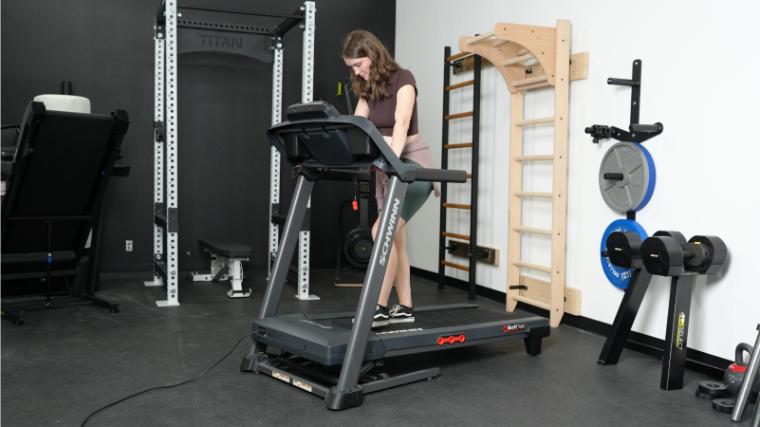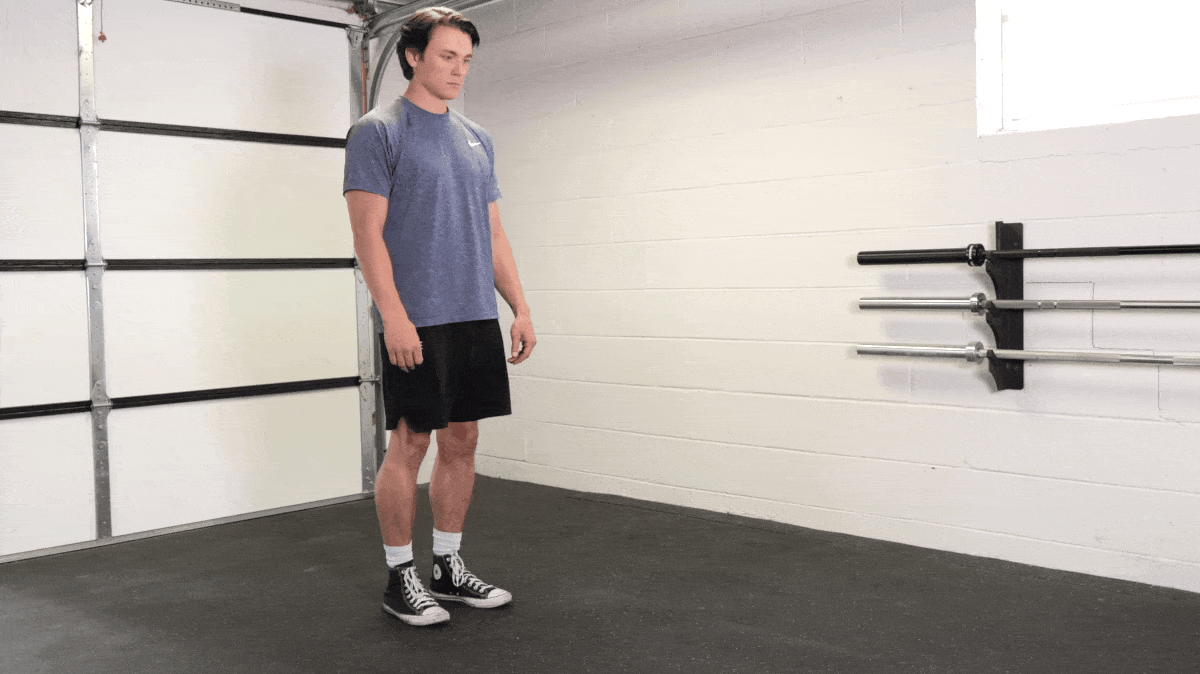With all of the muscle-pumping energy you pour into your strength training, you can’t be blamed for casting high-intensity cardio to the side. But then again, you don’t want to shirk your heart health entirely — and you’ve heard about all of the wonderful health benefits of brisk walking.
That’s when you notice those 5K events in your local park, which means there will be plenty of folks walking alongside you should you choose to enter. You know it’s not a pure road race, but the competitive part of your brain still wants to hit the finish line at a respectable time for your age group. So with that in mind, what sort of 5K time should you be striving to achieve? How long does it take to walk a 5K, anyway?

To get the best advice for you, I chatted with walking coach and treadmill specialist Ludgina Dieujuste for some tips to help you put together a training program for walking a faster 5k.
How Long Does it Take to Walk a 5K?
One of the difficulties with tracking 5K walk times is that there are very few cases where 5K walking events are separated from 5K runs. As a consequence, there is nothing preventing someone from entering a 5K event, and then power walking the entire distance on race day. So the average finish times for the beginner and novice categories have the times of walkers factored into them.
The average finish time for a 5K run for adult beginners assigned female at birth is just under 40 minutes, whereas the average for adult beginners assigned male at birth is around 35 minutes. On the other end of the spectrum, the world record for a 5K racewalk is just over 18 minutes in the men’s category and just over 20 minutes in the women’s.
[Read More: The Best Treadmills for Walking, Researched and Tested by Our Team]
To put that into perspective, the world records for racewalking rival — and in some cases exceed — the elite time classifications for 5K runs across most age groups. This means that world-class racewalkers may be able to compete with elite runners.
Using accelerometry, one study projected that participants across all tested genders and age groups would complete a 5K in about 60 minutes. (1)
How Many Minutes Does It Take to Walk a 5K by Age and Gender?*
[Read More: The Best Budget Treadmills on the Market]
Another study showed that elderly adults casually walked at an average pace of 4.8 to 5.6 km/h, or 3.0 to 3.5 miles per hour. (2) These projections also suggest an average 5K finish time of around 60 minutes for people walking the distance casually.
Tips to Improve Your 5K Time
You may have gravitated toward walking workouts solely for the health benefits, but that doesn’t mean you should place zero emphasis on your walking speed. Dieujuste has some tips for you here.
Don’t Overswing With Your Arms
Despite what your natural walking form might be, you may be one of those people who tends to equate speeding up your walk with increased arm activity. Whether you have a proclivity to pump your arms hard or swing them across your body, neither approach is doing you the favors that you might think it is.
“A lot of people don’t notice what their arms are doing when they’re walking on their own,” says Dieujuste. “They may put their arms at 90 degrees, but then they start swinging their arms in front of their body, which is not efficient at all. You’re losing a lot of energy which can affect you in other ways, and leading to tightness in other areas that won’t help you move any faster.”
[Read More: How Many Steps in a Mile? Calculate by Height and Pace]
Instead, keep your shoulders and hands relaxed with a natural movement cadence.
Don’t Overstride With Your Legs
One of the ways to shorten the amount of time it takes you to walk 5,000 meters is to lengthen each step you take. Theoretically, you could take longer steps while traveling at the same rate, reaching your destination in less time. Unfortunately, this form of overstriding is more likely to upset your balance than it is to speed you up.
[Read More: Expert Tested: The Best Treadmills for Running]
“Overstriding is not only an inefficient type of movement, but it can lead to injury as well,” explains Dieujuste. “Your feet need to be below your center of gravity, so you’re better off taking short, quick steps that allow you to maintain your power and balance. That way you can optimize your heel-to-toe movement and foot placement, and move with a cadence that’s conducive to speed and comfort.”
Have a Plan to Build Endurance
Because walking is a basic form of locomotion, the idea of putting together a rigid training schedule just to walk faster may seem like overkill. However, walking is an authentic sport, and you’ll want to come up with an exercise plan to get faster. That includes having a proper dynamic warm-up sequence, fast-paced walks to boost your heart rate, and even rest days to aid your recovery.
[Read More: The Best Leg Exercises for Muscle & Strength, According to a PhD]
“To truly get the most out of your walk, think about increasing the duration and intensity of your walks over time to build that cardiovascular endurance,” advises Dieujuste. “In your first week, you want to start off slow with walks of about 15 minutes and gradually increase from there. Each week, you want to increase your walking distance by 10 to 15 percent. That’s a good training plan to start going longer distances and boost your cardiovascular fitness.”
Do Some Strength Training
Training to run isn’t exclusively about running. Elevating your fitness level to walk faster also involves some steps aside from those you take on a walking track. It has far more to do with crafting a balanced exercise program that includes strength training.

[Read More: The Best Cross-Training Shoes on the Market]
“It’s important not just to walk, but to also add cross training — that’s the piece that people tend to forget,” says Dieujuste. “Strengthening your legs, your core, and your upper body is going to help you get faster. Incorporating strength training two to three times a week with exercises like squats, lunges, calf raises, planks, or other core workouts can give you the flexibility and mobility you need to get faster and to train repeatedly.”
Learn the Rules of Racewalking
If you intend to take this all the way and actually compete in a racewalk, you will need to learn a specific set of rules. The best racewalkers in the world can finish a 5K in 20 minutes or less, which is a time that beats many people’s best 5K run times. However, to lower your walking time to this level, you’ll need to follow the rules.
“Walking is a highly regulated sport,” explains Dieujuste. “If you’re racewalking, you have to make sure that one of your feet is always on the ground. Your leading leg has to be straight; you can’t have a bent knee. So there are a lot of different rules as opposed to someone who is casually walking for a charity, or doing it for personal health reasons.”
Frequently Asked Questions
If you’re looking for some very simple guidance to help you prepare for a 5K, check out the answers to the questions below!
How far is a 5K walk?
A five kilometer walk is 3.1 miles, or 16,368 feet.
Can I walk in a 5K race?
While some 5K running races require pre-qualification based on a cut-off time, several 5K events will encourage you to walk at an easy pace if you desire. Check the regulations of any local races you’re interested in.
How many minutes is a 5K walk?
The time it takes you to complete a 5K walk will vary based on your age, your experience level, and how fast you are attempting to walk. While it can easily take an unhurried person more than an hour to walk a 5K, several world-class racewalkers of different genders have successfully finished 5Ks in 21 minutes or less.
What is an average walking pace?
Studies have demonstrated the average walking pace of a non-racing adult to be between three and four miles per hour. (2)
Editor’s Note: The content on BarBend is meant to be informative in nature, but it should not be taken as medical advice. When starting a new training regimen and/or diet, it is always a good idea to consult with a trusted medical professional. We are not a medical resource. The opinions and articles on this site are not intended for use as diagnosis, prevention, and/or treatment of health problems. They are not substitutes for consulting a qualified medical professional.
References
- Schimpl M, Moore C, Lederer C, Neuhaus A, Sambrook J, Danesh J, Ouwehand W, Daumer M. Association between walking speed and age in healthy, free-living individuals using mobile accelerometry–a cross-sectional study. PLoS One. 2011;6(8):e23299.
- Alves F, Cruz S, Ribeiro A, Bastos Silva A, Martins J, Cunha I. Walkability Index for Elderly Health: A Proposal. Sustainability. 2020; 12(18):7360.
The post How Long Does it Take to Walk a 5K? (+ Tips to Walk Faster From a Walking Coach) appeared first on BarBend.

